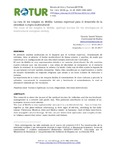Mostrar o rexistro simple do ítem
La ruta de los templos en Melilla: turismo espiritual para el desarrollo de la identidad europea multicultural
| dc.contributor.author | Borrell Velasco, Victoria | |
| dc.date.accessioned | 2019-03-01T07:45:10Z | |
| dc.date.available | 2019-03-01T07:45:10Z | |
| dc.date.issued | 2018 | |
| dc.identifier.citation | Velasco, V. (2018). La ruta de los templos en Melilla: turismo espiritual para el desarrollo de la identidad europea multicultural. ROTUR. Revista De Ocio Y Turismo, 12(1), 12-28. https://doi.org/10.17979/rotur.2018.12.1.3426 | es_ES |
| dc.identifier.issn | 1888-6884 | |
| dc.identifier.uri | http://hdl.handle.net/2183/22025 | |
| dc.description.abstract | [Resumen] El presente análisis profundiza en el impacto que el turismo espiritual, denominado de reflexión, tiene al afrontar el hecho multicultural de forma creativa y pacífica, de modo que contribuye a la configuración de una identidad europea intercultural e inclusiva.El caso de Melilla es muy representativo debido a su carácter pluricultural. En ella conviven cuatro culturas que, sin renunciar a sus señas de identidad, se enriquecen en el contacto diario: la cristiana, la musulmana, la hebrea y la hindú. Cada una de ellas aporta la riqueza de su patrimonio cultural también inmaterial. Todas ellas manifiestan su espiritualidad a través de rituales elaborados en espacios religiosos que atraen a un buen número de visitantes y turistas.La experiencia de la visita a los templos facilita el conocimiento de otras culturas y permite la reflexión, aumentando la comprensión del otro y facilitando el entendimiento, lo cual es altamente valorado por los visitantes | es_ES |
| dc.description.abstract | [Abstract] This research is about the impact of the spiritual tourism for reflection and the multicultural management in a creative and pacific way. This potencial contributes to the creation of an European multicultural identity. The case of Melilla is very representative because it is a multicultural city. Four cultures live together in this place without renouncing to their signs of identity, enriching by the daily contact Christians, Muslims, Jews and Hindus coexist in harmony. Each of them contributes their intangible cultural heritage. All this cultures shows their spirituality and complex rituals in religious spaces that attract many tourists and visitors. The experience of the visit to the temples gives the knowledge about other cultures and stimulates the reflection, increasing the comprensión about other people and improving the relationships. This question is very valued by the tourists | es_ES |
| dc.description.sponsorship | Ministerio de Economía y Competitividad; HAR2014-53024-P | es_ES |
| dc.language.iso | spa | es_ES |
| dc.publisher | Universidade da Coruña | es_ES |
| dc.relation.uri | https://doi.org/10.17979/rotur.2018.12.1.3426 | |
| dc.rights | Atribución-CompartirIgual 4.0 España | es_ES |
| dc.rights.uri | http://creativecommons.org/licenses/by-sa/4.0/es/ | * |
| dc.subject | Turismo espiritual | es_ES |
| dc.subject | Cultura | es_ES |
| dc.subject | Religiosidad | es_ES |
| dc.subject | Identidad intercultural. | es_ES |
| dc.subject | Spiritual tourism | es_ES |
| dc.subject | Culture | es_ES |
| dc.subject | Religiosity | es_ES |
| dc.subject | Multicultural identity | es_ES |
| dc.title | La ruta de los templos en Melilla: turismo espiritual para el desarrollo de la identidad europea multicultural | es_ES |
| dc.title.alternative | The route of the temples in Melilla: spiritual tourism for the development of multicultural European identity | es_ES |
| dc.type | info:eu-repo/semantics/article | es_ES |
| dc.rights.access | info:eu-repo/semantics/openAccess | es_ES |
| UDC.journalTitle | ROTUR. Revista de ocio y turismo | es_ES |
| UDC.volume | 12 | es_ES |
| UDC.issue | 1 | es_ES |
| UDC.startPage | 12 | es_ES |
| UDC.endPage | 28 | es_ES |
| dc.identifier.doi | https://doi.org/10.17979/rotur.2018.12.1.3426 |






